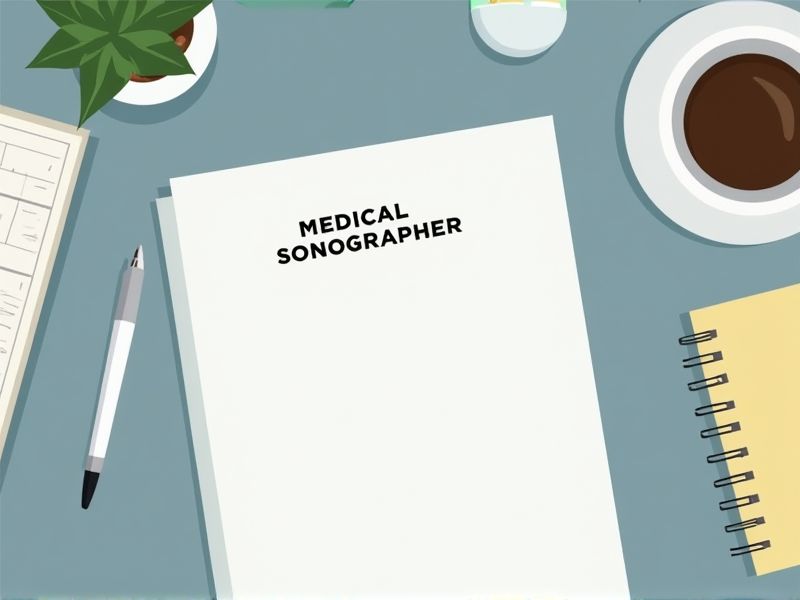
Medical sonographers play a critical role in diagnostic imaging, requiring specialized knowledge to accurately interpret ultrasound data. Certain certifications ensure they possess the technical skills and comprehensive understanding necessary for high-quality patient care. These certifications help maintain safety standards and reduce diagnostic errors by ensuring proficiency in the latest techniques. Some important certifications you may need for a medical sonographer include those focused on specific areas of sonography.
RDMS (Registered Diagnostic Medical Sonographer)
RDMS ensures that medical sonographers have standardized knowledge and skills, enhancing diagnostic accuracy. With RDMS certification, hospitals and clinics can maintain high-quality imaging services, crucial for patient care. Certification often leads to increased trust among patients and healthcare providers, driving demand for RDMS credentials. RDMS holders tend to have better career opportunities and salary prospects, incentivizing professional development in the field.
RDCS (Registered Diagnostic Cardiac Sonographer)
The demand for RDCS certification arises because it ensures that a sonographer has specialized knowledge and skills in cardiac imaging, critical for accurate diagnosis. Hospitals and clinics often require this credential to maintain high standards of patient care in cardiology departments. The RDCS designation also reflects a commitment to ongoing education, adhering to advancements in imaging technologies and techniques. This certification supports professional credibility, often influencing employment opportunities and career advancement in the medical field.
RVS (Registered Vascular Specialist)
RVS certification ensures that medical sonographers possess specialized knowledge in vascular technology, enhancing diagnostic accuracy for patients with vascular conditions. This advanced qualification reduces the likelihood of misdiagnosis, thereby improving patient outcomes and treatment effectiveness. Healthcare facilities often prefer RVS-certified professionals to maintain high standards in vascular diagnostics. By obtaining RVS certification, medical sonographers demonstrate their commitment to ongoing professional development and expertise in their field.
Basic Life Support (BLS) Certification
Basic Life Support (BLS) certification equips medical sonographers with essential life-saving skills in case a patient experiences sudden cardiac arrest during an ultrasound examination. The training ensures they can maintain effective circulatory and respiratory support, aligning with healthcare standards and safety protocols. In emergency situations, timely intervention by a BLS-certified sonographer can significantly improve patient survival rates. Healthcare facilities often require this certification as part of compliance with accreditation and regulatory requirements.
Advanced Cardiovascular Life Support (ACLS) Certification
Obtaining ACLS certification equips a medical sonographer with the skills to respond effectively to cardiovascular emergencies, potentially improving patient outcomes. In cases where sonographers work in environments like emergency rooms or cardiac units, their ability to provide immediate life-saving interventions becomes crucial. Hospitals and clinics often require ACLS certification to ensure all medical staff can contribute to emergency care teams. Maintaining this certification reflects a commitment to professional development, enhancing the sonographer's credibility and career opportunities.
Pediatric Advanced Life Support (PALS) Certification
Pediatric Advanced Life Support (PALS) Certification equips medical sonographers with the skills to recognize and respond to pediatric emergencies, ensuring enhanced patient safety. The certification standardizes emergency care procedures, allowing sonographers to work efficiently alongside healthcare teams during critical situations. Hospitals and clinics often mandate PALS certification to meet accreditation and quality assurance standards, which directly impacts patient care outcomes. Medical sonographers with PALS certification can offer more comprehensive support in pediatric settings, improving both operational readiness and family reassurance during emergencies.
Certified Ultrasound Educator (CUE)
Becoming a Certified Ultrasound Educator (CUE) enhances a medical sonographer's teaching skills, facilitating improved training for students and peers. Accurate ultrasound interpretation hinges on proper education, which CUE ensures through standardized teaching methods and updated guidelines. Credentialing as a CUE signifies a commitment to professional development, elevating the educator's credibility and trust among colleagues. By focusing on high-quality instruction, CUE contributes to better patient outcomes through accurate diagnosis and treatment planning.
Vendor-Specific Ultrasound Certification (e.g., GE Healthcare)
Vendor-Specific Ultrasound Certification ensures that medical sonographers are proficient in using the unique features and capabilities of equipment from a particular manufacturer. This proficiency reduces the likelihood of operational errors and enhances diagnostic accuracy. Familiarity with vendor-specific technologies improves workflow efficiency, as sonographers can swiftly navigate system interfaces and settings. Certification validates the sonographer's skillset to employers, making them more competitive candidates in the job market.
Cardiac Sonography Certificate
A Cardiac Sonography Certificate equips medical sonographers with specialized knowledge in imaging technologies that specifically focus on the heart. Hospitals and healthcare facilities often require this certification to ensure that sonographers meet the industry standards for quality care in cardiac diagnostics. The certification acts as a formal validation of a professional's skills in interpreting and conducting echocardiograms and other heart-related assessments. Employers regard certified medical sonographers as more competent and reliable, potentially leading to higher job opportunities and career advancement in the field.
Advanced Ultrasound Imaging Certification
Advanced ultrasound imaging certification enhances a medical sonographer's ability to identify complex medical conditions through improved image interpretation. Certification often leads to increased job opportunities and higher salary potential due to specialized skills. Health facilities with certified sonographers also tend to see better patient outcomes and increased trust from patients. The certification process ensures that sonographers stay updated with the latest technological advancements and best practices in the field.
Summary
By obtaining certifications, you can enhance your credibility and trust with patients and employers as a Medical Sonographer. Certifications can lead to greater job opportunities, often resulting in higher salary potential due to specialized skills validation. Employers might view you as more competent, potentially leading to career advancement and leadership roles. Continuous education through certifications often keeps your skills up-to-date with industry standards, fostering better patient outcomes.
